BETAFPV SuperD ELRS Diversity
BETAFPV SuperD ELRS BETAFPV SuperD ELRS is the first True Diversity receiver which applies dual antennas, dual receiver chains and TCXO (Temperature Compensated Crystal Oscillator) technology, achieving super accurate frequency matching and excellent performance in extreme temperature environments. It offers 2.4GHz and 915MHz/868MHz versions and largely meets the reliability requirement for long-range flight, aerial photography or FPV freestyle tricks. Recommend ExpressLRS Recovery Stick for flashing or resetting your receiver. Bulleted list A true diversity receiver with two complete RF receiver chains (referred to as dual SX1280/SX1281 or dual SX1276), based on the latest official ExprssLRS. Comes with ExpressLRS V3.0.0 firmware....
Pay online with PayPal, credit, debit and prepaid cards securely, even on delivery!
BETAFPV SuperD ELRS
BETAFPV SuperD ELRS is the first True Diversity receiver which applies dual antennas, dual receiver chains and TCXO (Temperature Compensated Crystal Oscillator) technology, achieving super accurate frequency matching and excellent performance in extreme temperature environments. It offers 2.4GHz and 915MHz/868MHz versions and largely meets the reliability requirement for long-range flight, aerial photography or FPV freestyle tricks.
Recommend ExpressLRS Recovery Stick for flashing or resetting your receiver.
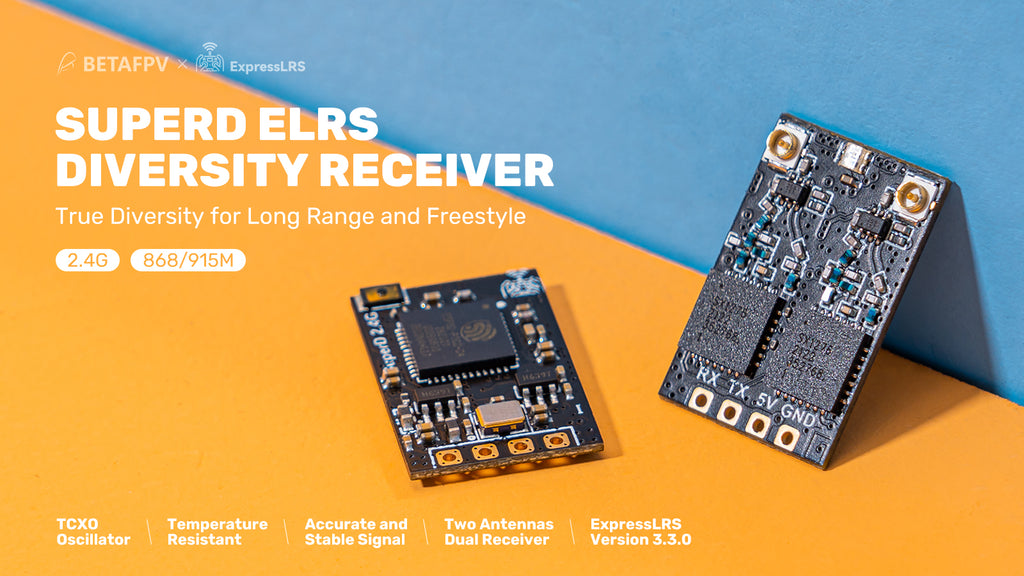
Bulleted list
- A true diversity receiver with two complete RF receiver chains (referred to as dual SX1280/SX1281 or dual SX1276), based on the latest official ExprssLRS. Comes with ExpressLRS V3.0.0 firmware.
- The ultra-light weight is only 1.1g without the antenna. The receiver board has a reasonable layout and is perfectly clean. Very easy to solder.
- Two Dipole T antennas will create an omnidirectional signal for good signal transmission. It is recommended to place the antenna separately and vertically as far apart as possible to get a better signal.
- It is not only used for FPV drones but also for fixed wing FPV or other FPV aircraft. It has superb performance in long range flight.
- The first true diversity receiver for the 915 MHz/868 MHz frequency bands, with two separate receiving modules working together to improve signal reception quality and overall reliability.
- The 900 MHz radio system exhibits greater diffraction capability due to its lower frequency, while 2.4 GHz systems tend to be directional and susceptible to attenuation caused by buildings, foliage, or moisture.
Specifications
- Item: BETAFPV SuperD ELRS 2.4GHz/915MHz/868MHz Diversity Receiver
- MCU: ESP32 PICO D4, dual SX1280 (SX1281) (2.4 GHz) / dual SX1276 (915 MHz /868 MHz)
- Telemetry Power: 20 dBm (2.4 GHz) / 17 dBm (915 MHz / 868 MHz)
- Weight excluding antenna: 1.1 g (2.4 GHz) / 1.2 g (915 MHz / 868 MHz)
- RF Frequency: 2.4 GHz (ISM) / 915 MHz FCC / 868 MHz EU
- Antenna connector: IPEX MHF 1/U.FL
- Input voltage: +5V DC @ "+" pad.
- Receiver protocol: CRSF
- PCB Size: 22mm x 14mm
First True Diversity Receiver with TCXO
The 2.4GHz SuperD ELRS Diversity Receiver is built in a TCXO (Temperature Compensated Crystal Oscillator), shared by two RF chips for a highly accurate clock source. The true diversity receiver including two RF chips and PA+LNA will generate a large amount of heat during operation. With the high-quality TCXO, it can withstand extreme temperatures without fear of hot and cold, continuously outputting a precise frequency for long-range flight. Click to learn more about the TCXO.
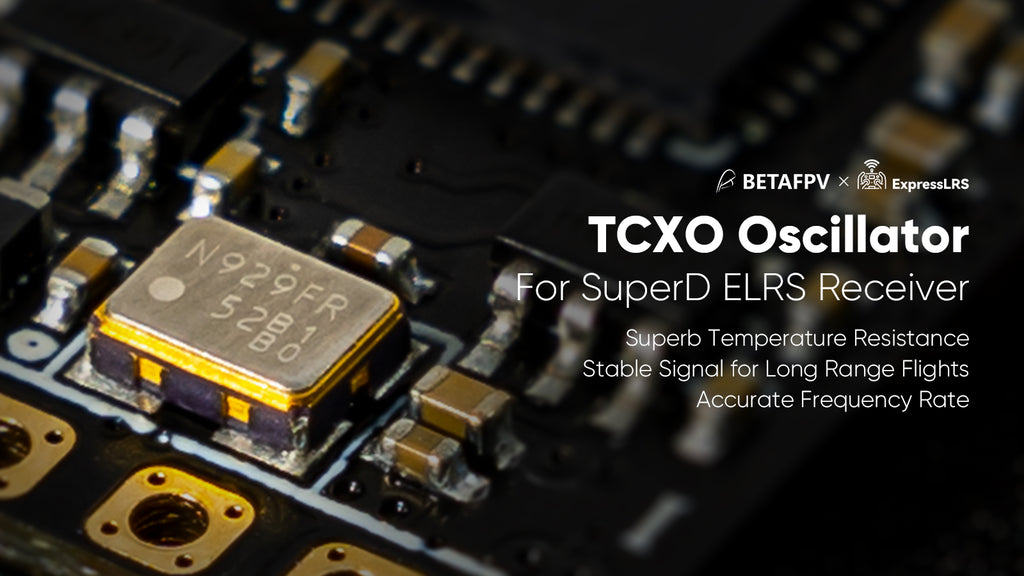
BETAFPV ExpressLRS Receivers
The 2.4GHz Diversity SuperD ELRS receiver has two RF receiver chains with two antennas, ensuring longer and more stable flights for FPV drones and RC airplanes. Choosing a suitable receiver for flying quadcopters or other RC models is very important. BETAFPV ExpressLRS receivers, including ELRS Lite, Nano, Micro and the newest SuperD, largely meet the pilots' requirements for FPV flight.
| SuperD RX | Micro RX | NanoRX | Lite RX | |
| Weight | 1.1g (2.4GHz), 1.2g (915/868MHz) | 3.5g (RX only) | 0.7g (RX only) | 0.47 g (tower), 0.53 g (plate) |
| Antenna | IPEX MHF1+T Antenna | IPEX MHF1+T Antenna | IPEX MHF1+T Antenna | Ceramic SMD Antenna |
| MCU | ESP32-PICO-D4 | ESP8285 | ESP8285 | ESP8285 |
| RF Chips | Dual SX128X + Dual PA (2.4GHz), Dual SX1276 (915/868MHz) | SX128X | SX128X + PA, SX1276 + PA | SX128X |
| Frequency | 2.4 GHz ISM, 915 MHz (FCC), 868 MHz (EU) | 2.4GHz ISM | 2.4 GHz ISM, 915 MHz (FCC), 868 MHz (EU) | 2.4GHz ISM |
| Telemetry Power | 100mW | 17mW | 100mW | 17mW |
| Serial Output Protocol | CRSF | PWM or CRSF | CRSF | CRSF |
| Model type | FPV Drone, Fixed Wing Aircraft | Fixed wing airplanes, helicopters, RC cars, RC boats | FPV Drone | Drone Scream |
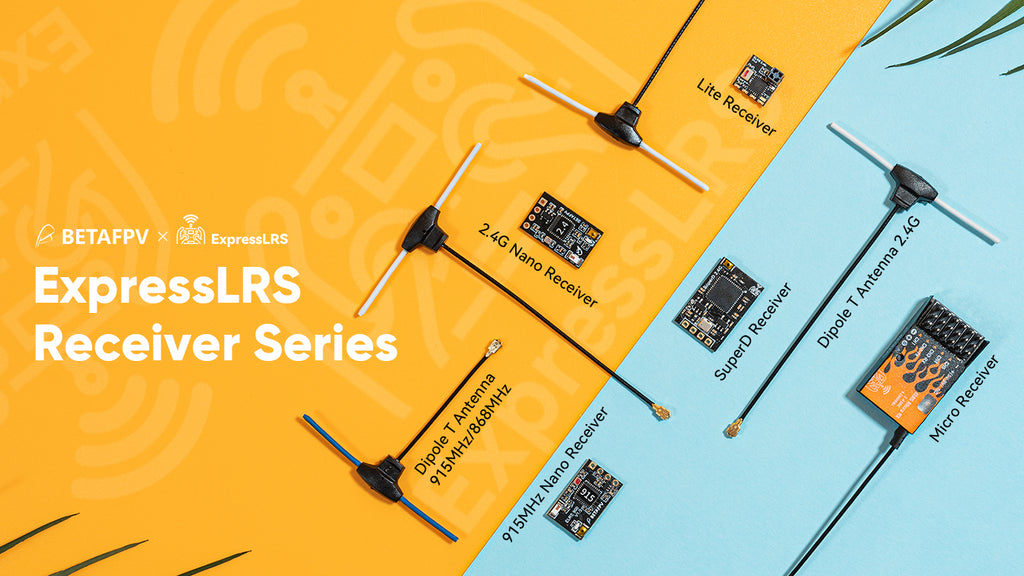
Diagram
The schematic of the 2.4GHz SuperD receiver version is shown below.
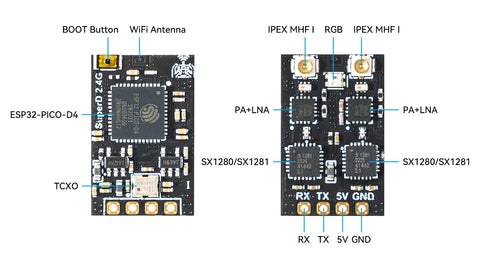
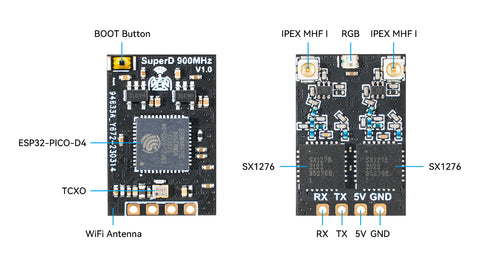
The RGB status indication of the SuperD receiver is shown below.
| RGB color | State | Description |
| Rainbow | Fade effect | Ignition |
| Green | Slow flashing | Wi-Fi update mode |
| Red | Fast flash | No RF chip detected |
| Orange | Double flash | Binding mode |
| Orange | Triple flash | Connected but not matching pattern matching configuration |
| Orange | Slow flashing | Waiting for connection |
| Solid | Connected and the color indicates the speed of the packet |
The RGB light color corresponding to the packet speed is shown in the following figure.
2.4GHz:

Note: F1000 and F500 are FLRC mode rate packets, which provide faster modulation and lower latency, but at the same time have a shorter reception distance than normal Lora mode. This mode is great for runners.
D500 and D250 are DVDA (Deja Vu Diversity Aid) mode packet rates. This mode operates at the F1000 data packet rate of FLRC mode, providing better link connection in case of complex interference by sending the same data packet multiple times. D500 and D250 indicate that the same data packet is sent twice and four times respectively.
915MHz/868MHz:

Note: D50 is a unique mode of ELRS Team900. With the 200Hz refresh rate of Lora mode, the same data packet is repeatedly sent four times, and the receiving distance is equivalent to 200Hz.
100Hz Full is a mode that realizes 16-channel full resolution output at the 200Hz refresh rate of Lora mode, and the receiving distance is equivalent to 200Hz.
Setup and pairing
ExpressLRS uses the Crossfire serial protocol (AKA CRSF protocol) to communicate between the SuperD diversity receiver and the flight controller board. Take the flight controller using Betaflight firmware as an example to introduce wiring and port configuration.
The connection between the SuperD diversity receiver and the flight controller is shown in the following figure.

Connect the flight controller to the Betaflight configurator for basic configuration. First, on the "Port" page, enable the flight controller's serial port (take UART1 as an example) as "Serial Rx".
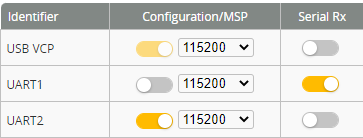
On the configuration page, set Receiver Mode to Serial (via UART) and Serial Receiver Provider to CRSF.
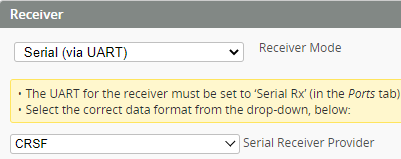
The default firmware of the SuperD diversity receiver uses the ExpressLRS V3.0.0 protocol and does not have a preset binding phrase. Therefore, the transmitter module firmware version must be ExpressLRS V3.0.0 or later. Both the receiver and transmitter modules must not have any binding phrases.
- Turn the receiver on and off 3 times, each step pausing for 2 seconds to enter binding mode;
- When the indicator starts flashing orange twice quickly, the reception is in binding mode;
- Enter the binding mode of the radio module or transmitter to bind with the receiver; if the indicator is solid, it indicates that the device has been successfully paired.
Note: After pairing once, the receiver will remember the saved pairing phrase and device automatically. Further device reboot will be done automatically without the need for rebinding process.
The default 2.4GHz firmware is ELRS V3.0.0. If you want to connect with a remote controller or transmitter module, please update it to V3.0.0 or higher. If you want to update the latest official ELRS firmware for the SuperD receiver, please update the ELRS Configurator to V1.5.2 or higher. Select the target device "BETAFPV SuperD 2.4GHz RX".
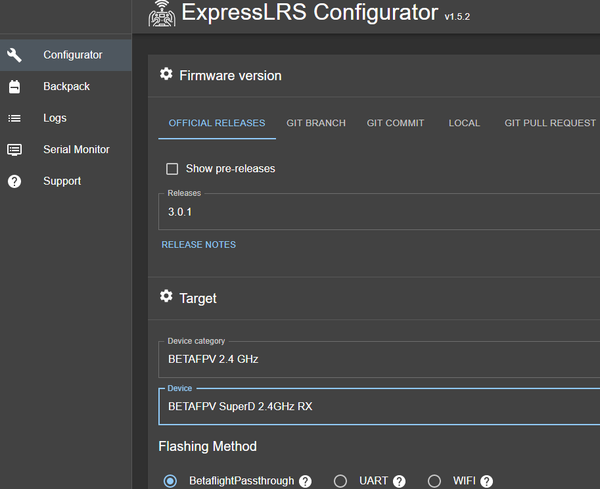
The default 915MHz/868MHz firmware is ELRS V3.3.0. The official version has not been released yet. It will be updated synchronously with ELRS V3.3. Then you can click the latest ELRS Nightly configurator to operate. Select the target device ''BETAFPV SuperD 900MHz RX''.
Note: The firmware for 915MHz/868MHz is currently self-compiled firmware.
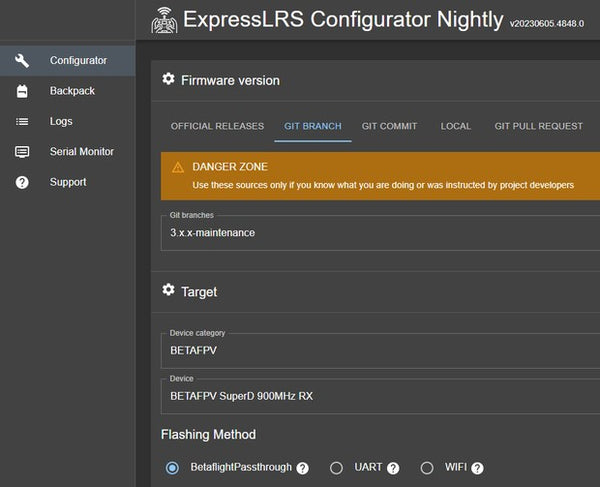
FAQ
- BETAFPV SuperD ELRS 2.4GHz Diversity Receiver User Manual for download.
- Download firmware for the Diversity SuperD ELRS 2.4GHz/915MHz/868MHz receiver.
- How to flash firmware via Passthrough or WIFI for SuperD Receiver.
- Download the STL file for 3D printing TPU supports for SuperD ELRS 2.4GHz Diversity RX.
Learn more about ExpressLRS
ExpressLRS is an open source RC binding for RC applications. Everyone could find this project on Github or join the discussion in Facebook Group.

Package Included
- 1 x 2.4GHz SuperD Diversity Receiver
- 2*2.4GHz T-Antenna
- 1 * 4 pin header
- 1 * 4-pin harness
- 1 * Instruction Manual
- 2 heat shrink tubes
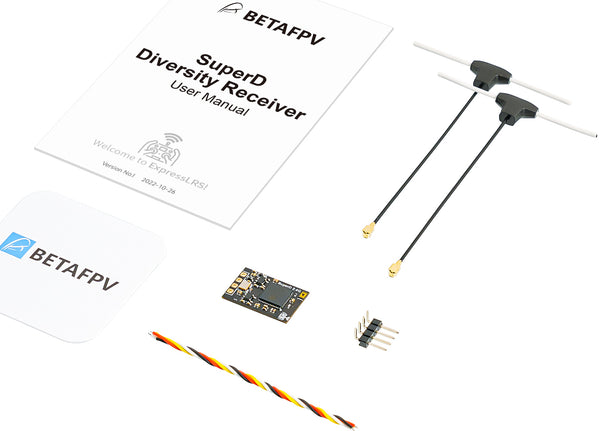
- 1 SuperD 915MHz/868MHz Diversity Receiver
- 2*915MHz/868MHz T Antenna
- 1 * 4 pin header
- 1 * 4-pin harness
- 1 * Instruction Manual
- 2 heat shrink tubes
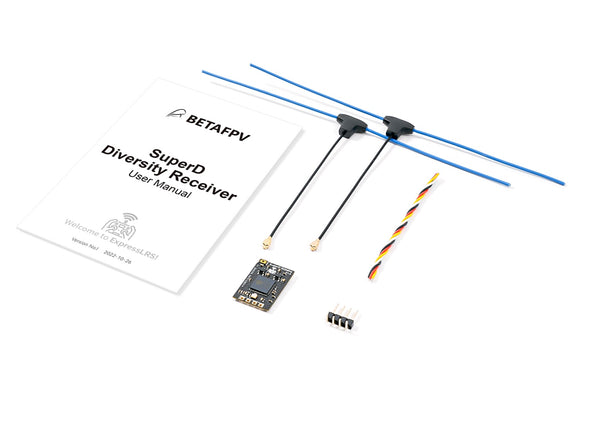
SHIPPING
Italy
• Express Shipping (1-4 working days)
• Free for orders over €150.00
• €9.99 for orders under €150.00
Europe (European Union)
• International Express Shipping (2-6 business days)
• €29.99 for all orders
PAYMENT METHODS
On Drone24hours.com you can use the following payment methods:
- Paypal
- Visa
- Visa Electron
- CartaSi
- Postepay
- MasterCard
- American Express
- Paypal prepaid cards linked to the Visa or Mastercard circuit
- Cash on delivery
Return Policy
You can return products that you are not satisfied with within 14 days of receiving your order. To be eligible for a return, the product must be in the same condition in which you received it, unworn or unused, with tags and in the original packaging. You must also have your receipt or proof of purchase.
Damaged or incorrect goods
In case you receive wrong or damaged goods, please contact us immediately within 14 days of receiving your order. Please send an email with photos and videos of the product, a detailed description of the problem and what you have done to solve it. You may be asked to return the item. For confirmed defective goods, we will send a replacement free of charge.
Exceptions / Non-returnable items
Some items cannot be returned, such as perishable goods (food, flowers, plants), personalized or made-to-order products, and personal care products (cosmetics). We do not accept returns on hazardous materials, flammable liquids, or gases. We do not accept returns on sale items or gift cards.
Exchanges
If you wish to exchange an item, the fastest way is to return it and place a new order for the new item.
Under the 24-month Legal Guarantee, Drone24Hours is responsible to the consumer for any defects in conformity that cannot be detected at the time of purchase.
The lack of conformity exists when the product is not suitable for the use for which it is normally intended, does not conform to the description or does not possess the qualities promised by the seller, does not offer the qualities and performances usual for a good of the same type, is not suitable for the particular use desired by the consumer if brought to the attention of the seller at the time of purchase and accepted by the seller (art. 129 of the Consumer Code).
Any lack of conformity which becomes apparent within 24 months of the date of purchase of the goods must be reported within 2 months of the date of discovery of the defect.
Unless proven otherwise, it is presumed that any lack of conformity that becomes apparent within 6 months of delivery of the goods already existed on that date. In the event of a lack of conformity, the consumer has the right to have the conformity of the goods restored, free of charge, by repair or replacement (art. 130 of the Consumer Code).
The consumer may ask, at his choice, the seller to repair the goods or replace them, free of charge in both cases, unless the requested remedy is objectively impossible or excessively expensive compared to the other. Repairs or replacements must be carried out within a reasonable time from the request of the Consumer; the average time for returning the product to the Consumer is 20 days.
If Drone24hours is unable to return the repaired product within the maximum period of 60 days, the consumer may request one of the alternative remedies (replacement, termination of the contract, price reduction).
Drone24Hours will send the product for any repairs to the Technical Assistance Center authorized by the Manufacturer.
What happens if the Service Center does not find the lack of conformity?
If the lack of conformity is not found, Drone24Hours will communicate the estimate to the Customer, who can decide whether or not to carry out the repair at his own expense. In this case, any transport costs and diagnosis of the defect requested by the Assistance Center will be borne by the Customer.
| Version |
ELRS 2.4 GHz, ELRS 915MHz, ELRS 868MHz |
|---|








